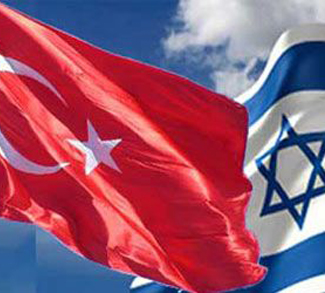 Barbara Slavin reports for InterPress Service:
Barbara Slavin reports for InterPress Service:
Turkey and Israel are close to resolving their dispute over last year's flotilla fiasco, but the partnership that existed between them for more than a decade will almost certainly stay submerged.
As a new flotilla of ships prepared to set sail for Gaza Tuesday, Turkish and Israeli officials and analysts said that only a major breakthrough on Israeli-Palestinian peace could begin to revive a relationship that once featured joint military exercises and hordes of Israeli tourists visiting Istanbul. Even then, the officials said, they doubted that the warmth of the 1990s and the mid-2000s would resurface.
Suat Kiniklioglu, deputy chairman for external affairs of Turkey's ruling Justice and Development Party (AKP), told a conference in Washington sponsored by the Middle East Institute Jun. 23 that "If there is not dramatic change in the Arab-Israeli conflict, I don't see a Turkish Embassy in Tel Aviv in five years."
Alon Liel, a former director general of the Israeli Foreign Ministry who served in Turkey in the early 1980s, agreed that the relationship is in peril.
"As long as there is no progress between Israel and the Palestinians – I mean Fatah and Hamas together – I don't think we will ever have a breakthrough with Turkey," he said.
Turkish-Israeli relations have gone through dramatic swings since Turkey became the first Muslim nation to recognise Israel 62 years ago, with ties plummeting during Arab-Israeli wars and after Israel's 1980 annexation of Jerusalem. The AKP, in power since 2002, has emphasised outreach to Muslim countries and taken a strong stand in support of the Palestinians.
The latest rupture dates from Israel's month-long assault on Gaza in late 2008-early 2009.
Israel said it had no choice but to act to stop a steady stream of rockets on Israeli cities and towns. However, "Operation Cast Lead", as Israel dubbed the Gaza campaign, killed more than 1,000 Palestinians, most of them civilians, did enormous damage to Palestinian infrastructure and was a public relations nightmare for the Jewish state.
Turkish Prime Minister Recep Tayyip Erdogan was particularly incensed because Turkey had been mediating at the time between Israel and Syria and had made considerable progress. Erdogan halted the indirect talks.
Relations deteriorated further after Israeli elections and the replacement of centrist Prime Minister Ehud Olmert's government by a rightist coalition led by Benjamin Netanyahu. Ties hit bottom on May 31, 2010 when Israeli commandos seeking to turn back a flotilla of ships trying to break the Israeli blockade of Gaza killed nine Turks aboard the Mavi Marmara, a Turkish vessel leased by an Islamic group, IHH, with ties to the Turkish government.
Israel now appears on the verge of agreeing to pay compensation to the families of those killed and to express regret for their deaths. Turkey, seeking not to reignite the dispute, has kept the Mavi Marmara from sailing again to the Gaza coast with a convoy of ships due to embark from Greece on Tuesday. Other ships are already on route from Spain and France.